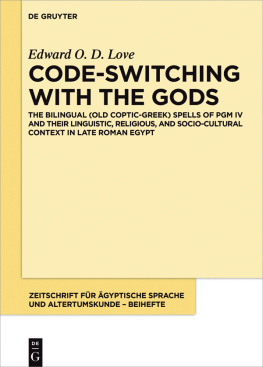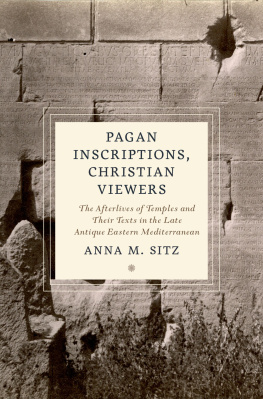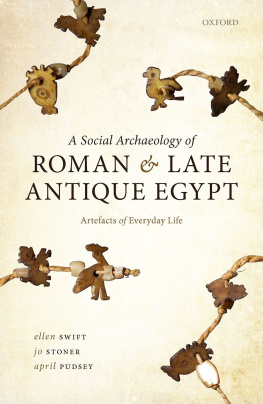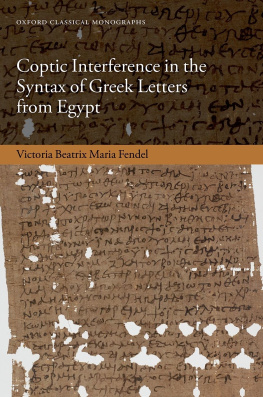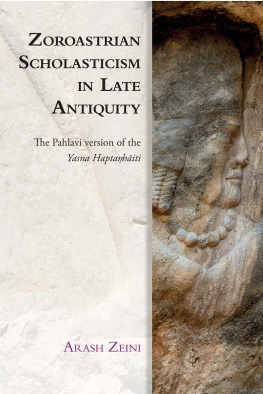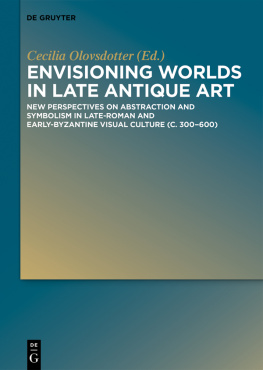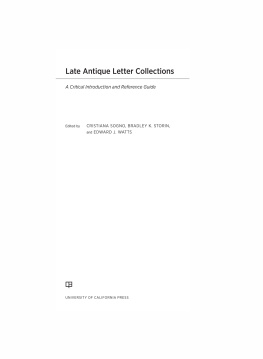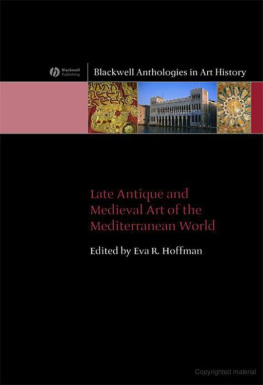
Edward O. D. Love
Code-switching with the Gods
Zeitschrift fr gyptische Sprache und Altertumskunde
Beihefte
Herausgegeben von
Susanne Bickel, Hans-Werner Fischer-Elfert, Antonio Loprieno, Sebastian Richter
Beirat
John Baines, Elke Blumenthal, Julia Budka, Richard Parkinson, Kim Ryholt, Stephan Seidlmayer, Jean Winand
Band 4

ISBN 978-3-11-046113-8
e-ISBN (PDF) 978-3-11-046783-3
e-ISBN (EPUB) 978-3-11-046636-2
ISSN 2198-6932
Library of Congress Cataloging-in-Publication data
A CIP catalog record for this book has been applied for at the Library of Congress.
Bibliographic information published by the Deutsche Nationalbibliothek
The Deutsche Nationalbibliothek lists this publication in the Deutsche Nationalbibliografie; detailed bibliographic data are available on the Internet at http://dnb.dnb.de.
2016 Walter de Gruyter GmbH, Berlin/Boston
www.degruyter.com
Acknowledgements
This study originated as the thesis of a Master of Studies (MSt) in Oriental Studies undertaken at the Griffith Institute of the University of Oxford during the academic year 20132014. Such a course of study would not have been possible without the generous studentship granted by the Arts and Humanities Research Council (AHRC), and hence I am firstly in the debt of the AHRC who awarded me such an opportunity based almost solely on my enthusiastic intentions. At that time, St Johns College provided an unparalleled environment in which to live, learn, study, and socialise, and as a result will always hold that feeling of home. During that academic year and since, the uncompromising patience and meticulous and erudite guidance of Professor Mark Smith, in every aspect of supervision, has facilitated this study in all its manifestations.
During the academic year 20142015, I was the recipient of the Michael Foster Memorial Scholarship, granted by the Deutsche Akademischer Austauschdienst (DAAD) in conjunction with the University of Oxford, in order to facilitate research abroad following graduation from my MSt. With this financial support and a network through which to be introduced to German society and culture, it was Professor Joachim Friedrich Quack who welcomed me in Heidelberg during that academic year, generously sharing his forthcoming or unpublished work on other Demotic magical texts and sources exhibiting instances of Old Coptic scripts, as well as feedback contributing to the accuracy of the text editions in this study, all of which has been much appreciated throughout. The productivity and pleasure of the experience was also thanks to the patience of my new colleagues in Heidelberg of both the Demotic and hieratic persuasions in particular during the months of silence during which I stumbled through the declinations and pronunciations of what was supposed to be German. In their prior forms as articles, Svenja Nagel was generous enough with her time to read through the treatments that became chapters four and five, providing both suggestions and encouragement. Chapter six would not have manifested as it has though I bear all responsibility for its current form without two crucial discussions during the unprecedented Egyptian and Jewish Magic conference in Bonn during July 2015. The treatment of the textual content of the bilingual exorcism benefitted in no small measure from a discussion with, and references to further literature provided by, Professor Gideon Bohak, while I also profited from a conversation on the topic of syncretism vs. synthesis among other things with Doctor Joseph Sanzo, who was also good enough to not only provide me with further references, but also a copy of his monograph. At both this conference, and that on Cultural Plurality in Ancient Magical Texts and Practices in Heidelberg during September 2014, my thoughts and hypotheses regarding magical practice in the context of the GEMP were both undermined and supported, stimulated and dissuaded, by discussions with Professors Jacco Dieleman and Richard Gordon, whose openness qualified by cutting honesty was very much appreciated. Despite never having met in person, Korshi Dosoo was generous enough to correspond extensively on the composition of the Theban Magical Library, sharing valuable original insights, and allowing me to summarise the most up-to-date appraisal of the archive in this study. My first academic year in Heidelberg concluded with the privileged offer from Professor Tonio Sebastian Richter and his fellow editors of the ZS to publish the following study not as a series of articles in the ZS, but as a Monograph in their relatively new Beiheft series, and I was absolutely delighted to accept their proposal, and will continue to remain most grateful for such an opportunity. I must also single out Doctor Lutz Popko for accommodating with such friendliness all my queries concerning formatting and submissions for the ZS when this study was still in article format, as also was the case with Katrin Hofmann and Doctor Mirko Vonderstein when this study passed into the jurisdiction of De Gruyter.
For permission to consult P. Bibliothque nationale Supplment grec. 574 (PGM IV), I am truly grateful to Monsieur Christian Frstel; Conservateur charg des manuscrits grecs in the Dpartement des Manuscrits at the Bibliothque nationale de France, who, along with the staff at the Richelieu-Louvois Library, welcomed me warmly, facilitating an effortlessly productive research trip during the 20th and 21st March 2014. During that time I was generously hosted by Dr Chlo Ragazzoli and Dr Adrian Travis, without whose hospitality such a trip would have not been viable, and whose advice throughout my stay was gratefully received.
I am delighted to have the opportunity to at last extend particular thanks to Catherine Warsi of the Griffith Institute for her inexorable ability to humour me with spontaneous requests to consult material, coupled with the perpetual willingness of her colleagues; Elizabeth Flemming, and Doctors Franscico Bosch-Puche and Vincent Razanajao, to accept my intrusion in the Topographical Bibliography, every such instance of which being of both comfort and encouragement during the course of my MSt and my not infrequent trips back to the Archive since. The support of another Oxford colleague Luigi Prada, must be noted not least due to his assistance with the Greek-language text, but in particular because of his insistence that it mustnt be, while that of my Heidelberg colleague Susanne ([su:zan]) Tpfer has certainly made significant contributions to maintaining the momentum needed to see this monograph through. It is also my hope that those Three Ladies from KHS will consider their impactful efforts well invested.
As was the case throughout the entire process of my BA and MSt, my Rents continued to be tireless and staunch supporters of my passion and direction during the last academic year of research, persevering with my being abroad, and providing support without which such a focus, and its product, would have been unattainable. Pas grammar school education, and perhaps more so his assiduous approach to proofreading, has also contributed no-end to the refining of the text as it now stands, while his inherent knack for the succinct has had a considerable impact on the development of my writing style over the previous three years. Without a doubt the adamantly resolute support I received from my otherwise indescribable Mutti was the foundation for every stepping-stone along the way that has converged in the writing of this study. As for Tom, perhaps if I had not got over myself, this study would not have manifested in the way it has, but regardless there is still only one John Morrison.
Next page
